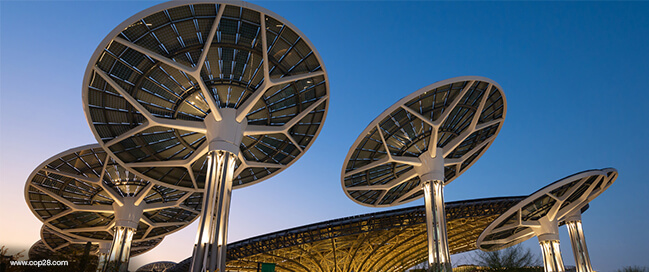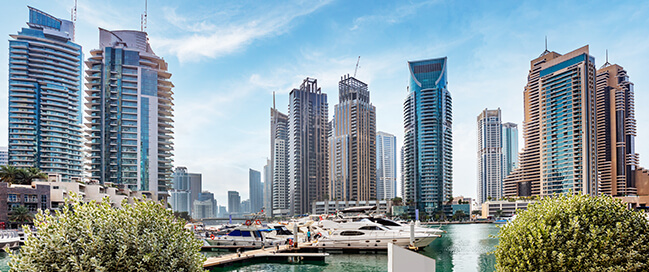
In terms of global climate action, COP28 UAE is taking place at a critical juncture. Unprecedented wildfires, floods, storms, and droughts are occurring all across the planet, and temperature records are being broken frequently. A lot more work has to be done, according to the UN’s global stocktake synthesis report, in order to achieve the objectives of the historic Paris Agreement. A significant chance to move the globe towards sustainability is provided by COP28.
Climate change initiatives are still being pursued at COP28 UAE, the Conference of the Parties’ 28th meeting. It is critical to respond to the facts, as it is near the midway point between the Paris Agreement and 2030. With only 7 years left, the key priorities must be achieving a 43% reduction in emissions while also implementing the essential changes in adaptation, financing, and loss and damage management.

The annual UN climate change conference, commonly known as the “Conference of the Parties” or “COP,” brings together diplomats, ministers, and world leaders to reach an agreement on how to combat climate change. Governments that have ratified the UN Framework Convention on Climate Change (UNFCCC), the Kyoto Protocol, or the Paris Agreement are among the negotiating parties. Thousands of representatives from international organizations, the commercial sector, civil society, and the media also attend the COPs.
The three main objectives of the Paris Agreement—to keep the global average temperature rise to “well below” 2°C and pursue efforts to limit the rise to 1.5°C above pre-industrial levels; to adapt to climate change and build resilience; and to align finance flows with a pathway towards low greenhouse gas emissions and climate-resilient development—have dominated the COPs since COP21 in 2015.
The negotiations in Dubai will be overseen by Dr. Sultan al-Jaber, the UAE’s minister of industry and advanced technologies, as well as the managing director and group managing director of the Abu Dhabi National Oil Company (ADNOC Group). Concerns regarding the impartiality of the climate negotiations have been raised by Al-Jaber’s position within the fossil fuel sector as well as the growing influence of fossil fuel lobbyists at COPs more generally.
Decisions at the COP are made by consensus. This makes it possible for striking a deal to be a challenging and emotionally charged process, especially when combined with the various requirements and interests of the parties.

COP28 is significant for some reasons, not the least of which is that it heralds the end of the first global stocktake (GST), the primary tool used to evaluate progress made in accordance with the Paris Agreement. Although it is obvious that the world is not on track to achieve the goals of the accord, it is hoped that governments will develop a roadmap at COP28 to speed up climate action.
The establishment of the loss and damage fund (created at COP27) and the agreement on a framework for the global goal of adaptation (GGA) of the Paris Agreement are two other crucial tasks that negotiators must complete in Dubai. The transformation of the food system and the transition to a more sustainable energy source are other problems that are likely to receive significant attention and may be represented in several negotiation streams. Additionally, talks and negotiations related to climate finance are likely to take centre stage, as is frequently the case.
Governments will continue discussing a new climate finance objective at COP28 to replace the $100 billion promise. The target date for an agreement is 2024, but significant advancement in Dubai is essential to establishing the basis for the COP the following year. Finance will also play a significant role in discussions about the GST and loss and damage, as was previously mentioned.
Finally, debates and pledges linked to scaling up and delivering on climate finance may have an impact on a variety of other negotiation topics and have the ability to either unlock additional action and ambition or hinder progress. This dynamic was on display at the Bonn climate talks in June 2023, where a number of developing nations protested the formal conference agenda item on scaling up developed country financing without it first being added.

Every year, a different nation hosts the COP. The United Arab Emirates (UAE) will serve as COP28’s host, and it will be held in Dubai from November 30 through December 12, 2023. A president is chosen by the host nation to preside over the negotiations; this president is crucial in liaising with governments and other stakeholders, offering direction and leadership, and eventually mediating the agreements reached.
Food systems and agriculture are getting more diplomatic attention as COP28 approaches. IN JULY, the COP28 presidency and the UN Food Systems Coordination Hub introduced the COP28 Food Systems and Agriculture Agenda. It urges nations to integrate their national food and agriculture policies with their nationally determined contributions (NDCs) and national adaptation plans (NAPs), as well as to include targets for food system decarbonization in both of these as well as their national biodiversity strategy and action plans (NBSAPs).

The logo’s spherical design in light and dark green is inspired by the idea of “one world” and features pictures of people, renewable energy technologies, animals, and other natural elements. It symbolizes the abundance of resources and highlights the necessity of innovation to spur sustainable development.
Countries are reminded to support urgent climate action by the design. In order to emphasize that Cop28 is a Cop for everyone—including the public and business sectors, academics, and civil society, as well as women and young people—this statement has been made.
Additionally, it spreads the idea that Cop28 will be a cop of action, attaining outcomes in terms of loss and damage, mitigation, adaptability, and money.

The Conference of the Parties (COP28) to the UN Framework Convention on Climate Change (UNFCCC) will hold its 28th session in 2023 at Expo City in Dubai, United Arab Emirates (UAE). COP28 UAE, held in Expo City Dubai, will have two zones.
The Blue Zone is a UNFCCC-managed location that is accessible to recognized parties and observers. The World Climate Action Summit, the nation pavilions, the presidency events, and hundreds of side events, such as panel discussions, round tables, and cultural activities, are all held there throughout the course of the two-week conference. It also holds formal negotiations.
The Green Zone, which welcomes non-accredited delegates from the youth sector, civil society, NGOs, the private sector, Indigenous organizations, and the general public, serves as a forum to encourage discussion and understanding about climate action. Registration for visitors is required, and once the schedule of events is set, more details will be made accessible.

If you’re attending the conference as a guest and this is your first time visiting Dubai, you should tour the city and check out all of the tourist activities available with Ootlah. Don’t forget to check out the Burj Khalifa, Dubai Ain, Dubai Frame, and the Museum of the Future, among Dubai’s most prominent structures. Visit museums and outdoor activities such as Green Planet, Global Village, Miracle Garden, Glow Garden, Dubai Aquarium, IMG World, and Madame Tussauds Museum if you’re seeking some excitement and intrigue.
We suggest taking a helicopter tour of Dubai to observe the city’s highlights from above if you have time to spend the day having fun or trying something new. Alternatively, you can reserve a dining cruise aboard the Flying Cup and eat lunch or dinner among the clouds. The best way to experience Dubai and its monuments is by balloon, where you can learn more about the city from above and have an unforgettable experience. In Dubai, you may also rent a yacht, Jet Ski, or go on a dhow cruise to take in the city’s beauty and the azure waters.